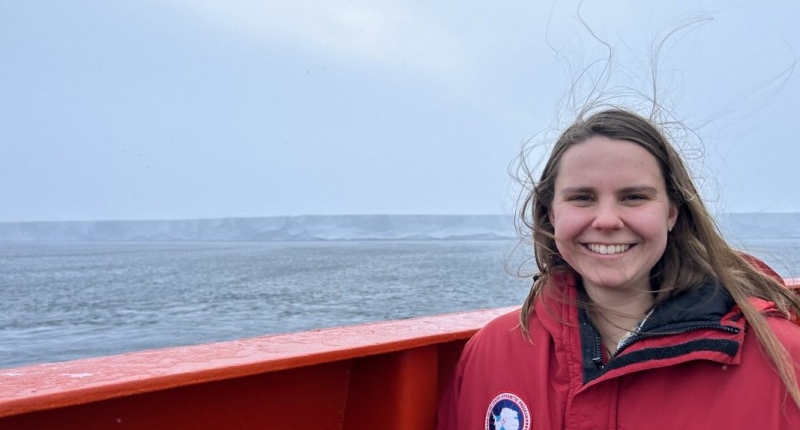Rachel Meyne, a graduate student at Binghamton University, recently spent 2½ months on board the Nathaniel B. Palmer, a U.S. Antarctic Program research vessel, as part of a National Science Foundation-sponsored trip. Meyne’s research focuses on diatoms, single-celled microalgae with a silica shell. The team aboard the ship was investigating the retreat of the Ross Ice Shelf during its last deglaciation period. Meyne will use data from the trip in her own research under her advisor at Binghamton, Assistant Professor of Earth Sciences Molly Patterson. The trip was a valuable experience for Meyne and will benefit her research efforts in many ways. Meyne is one of several graduate students on the trip, which was postponed by the pandemic. During the journey, the team remained on the open water except for a brief visit to McMurdo Station, where they explored trails and watched biologists check on the local seal population. Despite the challenges, Meyne viewed the experience as a privilege and a great opportunity to learn about data collection in the field.
A Graduate Student Conducts Research on Ancient Oceans Using Diatoms in Antarctica
Rachel Meyne, a graduate student at Binghamton University, recently spent 2½ months aboard the Nathaniel B. Palmer, a U.S. Antarctic Program research vessel, as part of a National Science Foundation-sponsored trip. Meyne and other graduate students were on board the icebreaker, which she describes as “the coolest way to explore the continent.” The team of researchers on the Antarctica trip was focused on the mechanisms and processes that led to the retreat of the Ross Ice Shelf during its last deglaciation period.
Meyne’s research focuses on diatoms, which are single-celled microalgae with a silica shell. These tiny fossils resemble glass and range in shape from circular to needle-like. Diatoms are extracted through sediment cores bored into the sea floor and can provide researchers with insights into the conditions of ancient oceans. “We use these diatom microfossils to classify different paleo environments,” Meyne explained.
The team boarded the Palmer in Lyttleton, New Zealand, on Dec. 15, 2020. Due to some team members testing positive for the coronavirus, they quarantined on board and set sail on Dec. 26. It took them 10 days to reach Antarctica, during which Meyne discovered the joys of playing ping pong on a boat in rough seas. She’s not bothered by motion, she said, although she took medication for seasickness during the journey.
During the trip, the team remained on open water except for a brief visit to McMurdo Station, where they explored trails and watched biologists check on the local seal population. Days were fascinating, unsurprisingly cold but also long, with 12-hour shifts containing a range of research-related tasks, from working with sediment cores to sampling seawater and imaging the ocean floor.
Meyne is originally from Texas and received her bachelor’s degree from Colgate University. She signed on to the research project before she came to Binghamton by way of Colgate Professor Amy Leventer, her advisor at the time. Meyne was supposed to sail in 2020, but the journey was postponed by the pandemic. She was thrilled to be able to go on the research trip, and she viewed it as a great opportunity to learn about data collection in the field. “It felt like such a privilege and I was very motivated to make the most of my time on board and collect as much data as I could,” Meyne said.
A Graduate Student’s Antarctic Research Benefits Future Study
Rachel Meyne, a graduate student at Binghamton University, recently returned from a 2½ month research trip in Antarctica aboard the Nathaniel B. Palmer, a U.S. Antarctic Program research vessel. Meyne’s research focuses on diatoms, which are single-celled microalgae with a silica shell, and she will use data collected during the trip to further her research with Assistant Professor of Earth Sciences Molly Patterson, her advisor at Binghamton.
While Meyne never imagined becoming a polar scientist before the trip, she now views it as a possibility. The experience was invaluable for Meyne, according to Patterson, as field experiences are crucial for students studying environmental change in remote regions. The connections Meyne made with other scientists during the trip will also benefit her research efforts in the future.
“As her advisor, I really cannot think of a better experience to train the future generation of polar researchers than the one she is experiencing,” said Patterson.
Don’t miss interesting posts on Famousbio
